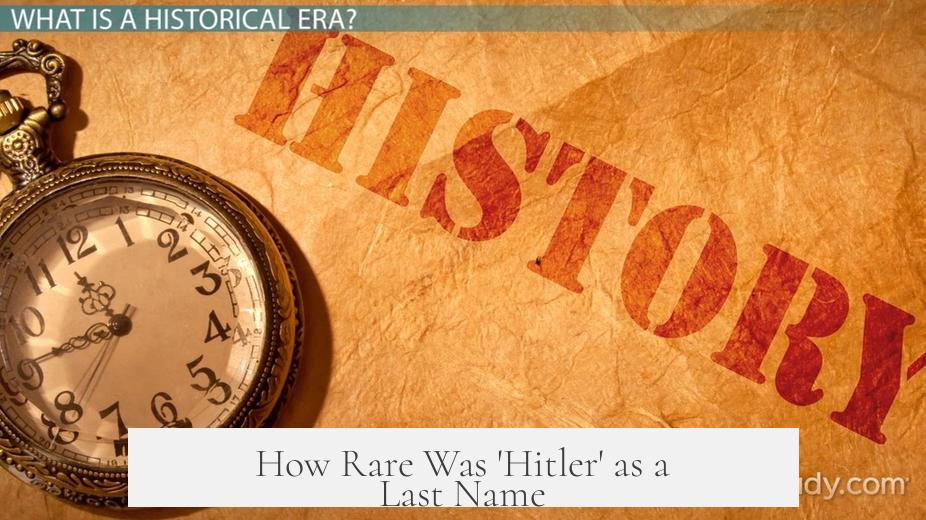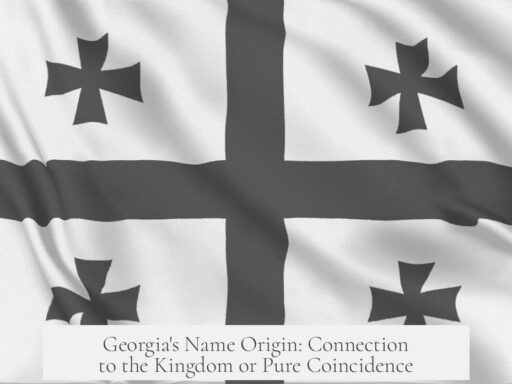The surname “Hitler” was extremely rare in Germany and Austria before the 1930s. It was not a common family name but rather originated from Adolf Hitler’s father, Alois, who changed his original last name from Schicklgruber to Hitler in the 1870s. The transformation from “Hiedler” to “Hitler” involved unclear reasons and represented essentially a new family name. Consequently, “Hitler” was virtually nonexistent beyond Adolf’s immediate family before the rise of the Nazi regime.
Alois Hitler’s background is key for understanding the rarity of the name. Born as an illegitimate child to a woman named Schicklgruber, Alois only adopted the Hitler surname later in life after his alleged biological father died. This late adoption meant the name did not have historical roots or widespread usage in the region.
After Adolf Hitler’s rise to power and especially following World War II, the surname gained extremely negative connotations. Family members took active steps to distance themselves from Adolf Hitler and his legacy. For example, Adolf’s sister, Paula, changed her surname to “Wolf” to avoid association with the notorious name. Similar actions were taken by other relatives and descendants.
Many of Hitler’s relatives changed their last name altogether and avoided having children, reportedly making a pact to end the Hitler bloodline. Some went as far as sterilizing themselves to sever ties with their infamous family name.
One notable example is William Patrick Hitler, Adolf’s British nephew. He changed his surname to Stuart-Houston after serving in the U.S. Navy during World War II. By the late 20th century, no known individuals with the surname “Hitler” existed in Germany or Austria.
These changes reflect broader social and cultural pressures. The surname “Hitler” carries an indelible stigma due to the atrocities of the Nazi era. Most people with any direct link avoided public association by legally adopting new names.
- The surname “Hitler” originated with Alois Hitler in the late 19th century.
- It was very rare and essentially unique to Adolf’s immediate family before the 1930s.
- Many relatives changed their names to escape the stigma after 1945.
- Some relatives reportedly agreed to end the Hitler bloodline, avoiding descendants.
- No known individuals with the surname “Hitler” remain in Germany or Austria today.
How Common Was the Surname ‘Hitler’ in Germany and Austria Before the 1930s? Did People Later Drop It Because of Its Connotations?

The surname ‘Hitler’ was exceptionally rare and largely unknown before the 1930s. The truth about its origins and the social impacts surrounding the name after Adolf Hitler’s rise to infamy reveal a fascinating yet somber narrative. Let’s explore where this name came from, how uncommon it actually was, and why the name essentially vanished from public use.
First things first, the surname ‘Hitler’ was not a widespread family name in Germany or Austria—it had unique origins closely tied to Adolf Hitler’s own family.
The Curious Origin of the Surname ‘Hitler’
Adolf Hitler’s father, Alois, was actually born Alois Schicklgruber. Yep, that’s right. The man who fathered one of the most infamous figures in history originally went by a different last name. He officially began using his stepfather’s surname, Hiedler, in the 1870s. But things get interesting here—the name was registered as ‘Hitler’ for reasons historians still consider unclear.
In fact, Alois Hitler was the first known person to bear the surname ‘Hitler.’ To put it simply, the name was more or less invented—or at least transformed—by Alois himself. This means the surname had no long family history before him, a rarity considering most surnames have deep-rooted origins in a region or profession.
How Rare Was ‘Hitler’ as a Last Name?

In the late 19th and early 20th centuries, ‘Hitler’ was quite rare. It was neither a common German surname nor a typical Austrian one. Some other people did have the name, but they were unrelated or distant relatives, and many chose to change it over time. Given this rarity, the sudden historical prominence of the name due to Adolf Hitler was shocking to many.
Actually, some of Adolf Hitler’s own relatives altered their surnames to avoid recognition or association. This hints early on at the name’s social sensitivity, long before it became universally infamous.
Did People Drop the Name ‘Hitler’ Because of Connotations?
Definitely. After Adolf Hitler’s rise to power, and especially after the devastation of World War II, the surname became a massive social burden. Holding that name in Germany or Austria was more than just embarrassing; it invited stigma and sometimes outright hostility.
Adolf Hitler’s sister, Paula, changed her last name to Wolf (or Wulf). She did this even before Adolf became the Führer, likely aiming to keep her family background private. This change was probably a mix of caution and an attempt to avoid public scrutiny.
The story gets darker with the broader Nazi leadership families. Some relatives of high-ranking Nazis, like Hermann Göring, decided to sterilize themselves. Given the overwhelming social difficulties their surnames caused, this tragic choice was aimed at ending their bloodlines. Rumors say that Hitler’s own relatives might have made a pact to end the Hitler bloodline, choosing not to have children to prevent the name from continuing.
William Patrick Hitler provides a particularly telling example. He was Adolf Hitler’s British nephew and even served in the US Navy during World War II. After the war, he changed his surname to Stuart-Houston—a clear move to distance himself from his infamous uncle’s legacy.
Does the Surname ‘Hitler’ Still Exist Today?

Interestingly, the surname ‘Hitler’ does not exist anymore in Germany or Austria. The social pressure, stigma, and widespread rejection of the name have collectively ensured its disappearance. Descendants have either completely changed their names or have no offspring to carry the name forward.
So, from an almost nonexistent surname before Adolf Hitler, to a globally recognized but now essentially extinct German-Austrian family name—this is an unusual journey. The rarity of the name wasn’t only about how many people held it before the 1930s but also about the consequences that followed its association.
What Can We Learn From This Curious Case?
- Names carry powerful weight. An invented or rare surname can suddenly gain global notoriety and affect generations after.
- Social stigma can enforce name changes. When society rejects a name because of its association, people take drastic steps to sever ties.
- Family histories are not just archives; they are living realities. The choices Adolf Hitler’s relatives made show how history shapes personal decisions.
Next time you think about how a name shapes identity, consider the story of ‘Hitler.’ It teaches us about cultural memory and the heavy price some names can carry. Isn’t it fascinating how a name invented in the late 19th century ended up carrying a burden so heavy that people would rather disappear, change who they are, or end their lineage entirely?
So, how common was the surname ‘Hitler’ before the 1930s? Nearly nonexistent and largely unique to Adolf’s immediate family. Did people later drop it because of its connotations? Yes, unequivocally. The social shockwaves triggered by that name were so profound that it has all but vanished in the German-speaking world.
Want to dive deeper? Consider exploring local archives or genealogical records that illustrate how rare the name truly was before Hitler’s era. And maybe, just maybe, you’ll find a story about a family deciding to pick a new name to escape the shadow of history.
How common was the surname “Hitler” in Germany and Austria before the 1930s?
The surname “Hitler” was very rare before the 1930s. Adolf Hitler’s father, Alois, was the first to officially use it. He changed his original surname, Schicklgruber, to Hitler in the late 1800s for unclear reasons.
Why did Alois Hitler change his surname from Schicklgruber to Hitler?
Alois was born Schicklgruber but later adopted the surname of his stepfather, Hiedler. This name was registered as Hitler, though the reason for this spelling change remains unknown.
Did family members of Adolf Hitler change their surnames? If so, why?
Yes. Some relatives, including Adolf’s sister Paula, changed their surnames to avoid association with him. For example, Paula Hitler took the name Wolf to stay anonymous and distance herself.
Does the surname “Hitler” still exist in Germany or Austria today?
No. The surname “Hitler” no longer exists in Germany or Austria. Relatives either changed their names or chose other ways to end the family line under that name.
Were there any efforts to end the Hitler family line after World War II?
Yes. Some relatives are rumored to have agreed not to have children to end the bloodline. Others even sterilized themselves to prevent continuing the family name tied to the Nazi regime.




